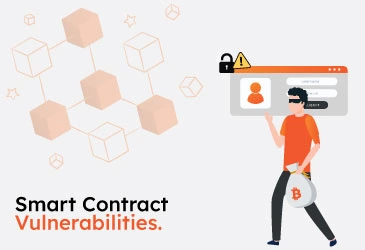Will Blockchain Replace Cloud? Know Their Synergy & Future
Updated : July 12, 2023

In the fast-paced digital era, People usually ask, “Will blockchain replace cloud?”. Being experts we answer this query backed with research. Both blockchain and cloud computing have emerged as transformative technologies. Blockchain, with its decentralized and secure nature, has disrupted traditional systems, while cloud computing has revolutionized data storage and accessibility. We suggest you get a smart contract audit for your business and secure your project.
This article explores the relationship between blockchain and cloud computing, delving into their unique features, potential disruptions, and the future outlook of their integration and replacement.
What Is Blockchain Technology?
Blockchain technology is a decentralized, distributed ledger that securely records transactions across multiple computers. Unlike traditional centralized systems, blockchain provides transparency, immutability, and enhanced security. Each transaction, or "block," is linked to the previous one, forming a chain. This technology has gained recognition in various sectors, from finance and supply chain to healthcare and real estate. Additionally, blockchain supports sustainability efforts.
What Is Cloud Computing?
Cloud computing enables users to store, manage, and access data and applications over the internet, eliminating the need for local storage and processing power. It offers several advantages, including scalability, cost-effectiveness, and ease of access. With cloud computing, organizations can leverage shared resources, reduce infrastructure costs, and scale their operations based on demand. Additionally, decentralized cloud computing-based services facilitate collaboration and enable real-time data analysis.
Can Blockchain Replace Cloud?
The question arises: can blockchain replace cloud computing? While blockchain offers unique features, it is not designed to replace the cloud entirely. Blockchain excels in providing decentralized, immutable, and tamper-resistant ledgers, making it ideal for certain applications, such as secure financial transactions or supply chain management. However, blockchain being different from traditional database models contain inherent design characteristics, such as limited scalability and slower transaction speeds, which pose challenges for large-scale data storage and processing.
Cloud computing, on the other hand, provides robust infrastructure, on-demand scalability, and efficient data processing capabilities. It serves as a reliable platform for hosting blockchain networks and storing large amounts of data. By integrating blockchain with cloud computing, organizations can leverage the benefits of both technologies. Cloud-based blockchain solutions can enhance data security, accessibility, and scalability while overcoming the limitations of standalone blockchain systems.
Research claims Blockchain to be the Catalyst for Cloud Reinvention - Discover How This Innovative Research Is Transforming the Digital Landscape.
Why Blockchains Are The Future Of Cloud Storage?
The integration of blockchain and cloud computing is an area of active research and development. Several initiatives aim to combine the strengths of both technologies to create innovative solutions. For instance, blockchain-as-a-service (BaaS) platforms offer ready-to-use blockchain networks hosted on cloud infrastructure, simplifying the deployment and management of blockchain applications.
Additionally, the emergence of hybrid cloud architectures allows organizations to maintain a balance between on-premises infrastructure and public or private cloud environments. This approach enables the deployment of blockchain and artificial intelligence networks on private cloud instances, ensuring data privacy and control while benefiting from the scalability and cost-effectiveness of cloud computing.
Moreover, advancements in technology, such as sharding and off-chain scaling solutions, aim to address blockchain's scalability limitations. These developments can enhance the performance of blockchain networks, making them more compatible and the future of cloud computing infrastructures.
Know Everything About Blockchain And Cloud Correlation
-
Is Blockchain Better Than Cloud Computing?
Blockchain and cloud computing serve different purposes. Blockchain excels in providing secure and decentralized ledgers, while cloud computing offers scalable data storage and processing capabilities. It's not a matter of one being better than the other, but rather how they can complement each other in various applications.
-
Is Blockchain A Threat To the Cloud?
Blockchain is not a direct threat to cloud computing. While blockchain offers unique features like transparency and immutability, it has limitations in terms of scalability and transaction speed. The integration of blockchain with cloud computing can enhance data security and accessibility rather than pose a threat.
-
Can You Use Blockchain As Cloud Storage?
Blockchain technology can be utilized for certain aspects of data storage, such as storing encrypted hashes or verifying data integrity. However, using blockchain as a complete replacement for traditional cloud storage solutions is not practical due to blockchain's limited scalability and higher costs compared to cloud storage systems.
-
What Are The Disadvantages Of Blockchain In Cloud Computing?
Some disadvantages of using blockchain in cloud computing include limited scalability, slower transaction speeds, and higher costs. Blockchain's distributed nature requires consensus mechanisms that can slow down data processing. Additionally, blockchain's immutability can pose challenges when modifications or updates are required in cloud-based environments.
-
Does Blockchain Need Cloud?
Blockchain itself does not necessarily require cloud computing, as it can function in a decentralized manner across multiple nodes. However, leveraging cloud computing infrastructure can provide benefits such as scalability, accessibility, and cost-efficiency. Cloud computing can serve as a platform for hosting blockchain networks and storing large amounts of data, enhancing the overall blockchain ecosystem.
Wrap Up
In summary, blockchain and cloud computing are distinct technologies with different purposes. Blockchain offers decentralized and secure ledgers, while cloud computing provides scalable data storage and processing. Instead of replacing the cloud, blockchain can enhance its functionality. The future lies in integrating these technologies to create secure, scalable, and cost-effective solutions. This integration drives innovation, shapes the digital landscape, and opens new possibilities for businesses and individuals as technology evolves.
Take control of your smart contract security - Request a professional Smart Contract Audit today and ensure the solidity of your blockchain projects
Insights

Smart Contract Audit Checklist
Smart contracts are self-executing agreements with the terms of the agreement between buyer and seller being directly written into lines of code ...

How To Audit Smart Contracts?
Smart contracts have become increasingly popular over the years as they provide a more efficient way of executing transactions in a decentralized ...

Smart Contract Vulnerabilities
Smart contracts have revolutionized how we conduct transactions and execute agreements in the digital age. These self-executing programs ...